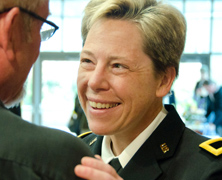How do you make yourself stand out? It’s easy to tell people to “take the hard jobs,” but preparation for the hard jobs is what really matters. I focused on building the skills I needed for the next level. This forward-focus positioned me to accept new opportunities without hesitation.
My personal reputation is what made me stand out and get offered the hard jobs. I was consistent and people trusted me. I earned this reputation by balancing technical competence, mission commitment, and leader character.
Building technical competence is the easy part—you do it by getting out of your office and learning from your people. You read professional journals and interact with your peers. You study your trade and expand your technical foundation.
Mission commitment is a little harder because you can’t fake commitment. Don’t take a hard job just to get ahead if you don’t believe in what you will be producing. Wait for a better opportunity so that your commitment is authentically aligned to job expectations. Your people can spot a fake. Without commitment, you might be tempted to burn a few bridges to excel—the short-term gain can damage your long-term reputation.
Your leader character will make you stand out. Your character is underpinned by your values, which are constant. My opinion is that, in American society, men outpace women in their access to character mentoring. Young men are taught about character while young women are taught appropriate behaviors to fit in. Find a character mentor. I am fortunate because Army character development and mentoring is gender neutral. My values are the Army Values—loyalty, duty, respect, selfless service, honor, integrity, and personal courage. By establishing a link between your values and your behaviors, you will develop a strong character that inspires others with trust and confidence.
On the Hardest Challenge I’ve Had to Face in My Career
I hid my authentic self from my coworkers for 25 years. The military’s Don’t Ask/Don’t Tell policy mandated that I must be fired if I revealed to anyone that I am gay. I loved being a soldier so much that I willingly marginalized myself in order to serve. Over time, this caused painful internal conflict because my personal values were increasingly at odds with the Army’s institutional values. The mental stress of hiding my everyday life and my partner (now wife), Tracey, was enormous. I am very proud that the military now aligns its family policy with the reality of same-sex marriage. Tracey and I are visible about our relationship to role model the new reality of military families and to signal that inclusion matters in the Army. I want my personal example to defy stereotypes.
On What It Takes to Stay Competitive
It takes competence, physical courage, people skills, and a commitment to lifelong learning to succeed. I have always read memoirs to broaden my worldview, modeled positive behaviors I admire in others, and shared credit with the team. “Climbing the ladder” requires different skills at each level. To stay competitive I consciously strive to perform today with the skills required for success at the next higher level of responsibility.







BG Smith,
Congrats to you. You are truly the epitome of what it takes to lead soldiers to success . You respect everyone equally and you don’t know a stranger. It is an honor to know you and to have served with you, I have taken a lot of what you taught me and I have been a more ground empathetic person because of you. Thank you for all you do for so many people and for touching people’s lives that leave one with a sense of purpose.